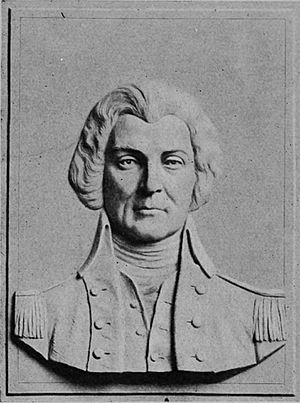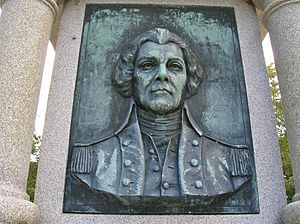Joseph Spencer facts for kids
Quick facts for kids
Joseph Spencer
|
|
|---|---|
 |
|
| Member of the Connecticut Council |
|
| In office 1780–1789 |
|
| In office 1776–1776 |
|
| Member of the Continental Congress |
|
| In office 1779–1779 |
|
| Preceded by | Oliver Wolcott |
| Succeeded by | Oliver Wolcott |
| Personal details | |
| Born | October 3, 1714 East Haddam, Connecticut, British America |
| Died | January 13, 1789 (aged 74) East Haddam, Connecticut, U.S. |
| Spouses |
Martha Brainerd
(m. 1738; Hannah Brown Southmaid
(m. 1756; |
| Children | 13 |
| Parents |
|
| Profession | Lawyer |
| Military service | |
| Allegiance | |
| Branch/service |
|
| Years of service |
|
| Rank | Major general |
| Battles/wars | |
Joseph Spencer (born October 3, 1714 – died January 13, 1789) was an important American leader from Connecticut. He was a lawyer, a soldier, and a politician. During the Revolutionary War, he helped lead the army as a major general. He also represented Connecticut in the Continental Congress, which was like the first government of the United States.
Contents
Early Life and Family Background
Joseph Spencer was born in East Haddam, Connecticut, on October 3, 1714. His parents were Isaac and Mary Spencer. His family was among the first settlers of East Haddam, arriving there in 1662.
Spencer's Career and Public Service
Joseph Spencer started his career as a lawyer. He practiced law until 1753, when he became a judge. He was also very active in the local army, known as the militia. He fought in King George's War and later served as a Lieutenant Colonel in the French and Indian War.
When the American Revolution began, Spencer was a Brigadier General in Connecticut's militia. In April 1775, he led his troops to help with the Siege of Boston. This was an early part of the war where American forces surrounded British troops in Boston. In June, his units became part of the new national army, called the Continental Army. Spencer was one of the first eight brigadier generals appointed to this army.
In 1776, Spencer was promoted to major general. He served in the Eastern Department of the Continental Army. However, his military career faced challenges the next year. He decided to cancel an attack on British forces in Rhode Island. This decision led to some disagreement with the Continental Congress. He asked for an official review of his actions and was cleared of any wrongdoing. Even so, he resigned from the army on June 14, 1778.
After leaving the military, Spencer continued his public service. He first served on the Connecticut Council (like a state senate) in 1776. In 1779, Connecticut sent him as a delegate to the Continental Congress. In 1780, he returned to the Connecticut Council and served there until he passed away. After the Revolutionary War, he became a founding member of the Society of the Cincinnati in Connecticut. This was a group for officers who had served in the Continental Army.
Personal Life and Descendants
On August 2, 1738, Joseph Spencer married Martha Brainerd. They had five children together. After Martha passed away in 1754, he married Hannah Brown Southmaid in 1756. With Hannah, he had eight more children, making a total of 13 children.
Some of his children included:
- Joseph Spencer, Jr. (1750–1824), who became a surgeon and helped his father during the Revolution.
- Isaac Spencer (born 1759), who later served as the Treasurer for the State of Connecticut.
- Jared Spencer (1762–1820), who was a twin. He went to Yale and became a lawyer.
Joseph Spencer passed away on January 13, 1789, in East Haddam, Connecticut. He was first buried in Millington Cemetery. Later, he and his wife were moved to Nathan Hale Park in East Haddam, where a monument was built to honor him.
Notable Descendants
Joseph Spencer's granddaughter, Elizabeth Spencer, married General Lewis Cass. Lewis Cass was a very important person in American history. He served as the governor of the Michigan Territory, a U.S. Senator from Michigan, and even as the secretary of state under President James Buchanan.


